
The circular economy is oriented to nature as its role model. In essence, the concept of the circular economy aims to keep raw materials in a closed loop. In this way, resources are maximally used, the need for new ones is reduced, waste is avoided and the life cycle of products is increased. In short, the waste of today becomes the raw material of tomorrow – the same as in nature.
The Greenland is a groundbreaking initiative aimed at promoting circular economy and green sustainability in the Mediterranean region. It is a collaborative effort between several European Union countries and partner countries in the Mediterranean, and it seeks to address the pressing environmental challenges facing the region.
The Mediterranean region is home to some of the most beautiful and biodiverse ecosystems in the world. However, it is also one of the most environmentally vulnerable regions due to climate change, pollution, and unsustainable practices. The Greenland recognizes these challenges and seeks to promote a more sustainable and circular approach to economic development in the region.
Circular economy is an economic system that aims to keep resources in use for as long as possible, by reducing waste, reusing and recycling materials, and designing products and processes for longevity and sustainability. It is an alternative to the traditional linear economy, which is based on the take-make-use-dispose model. The circular economy is a more sustainable and regenerative system that can reduce waste and pollution, create new jobs, and drive economic growth.
The Greenland focuses on three key areas of action: waste management, water management, and sustainable tourism. These areas are critical for the region’s economic and environmental sustainability, and the project aims to promote circular solutions in each of these areas.
In the waste management sector, the project seeks to reduce waste generation, promote recycling and reuse, and support the development of new circular business models. It also aims to reduce marine litter and plastic pollution, which is a major problem in the Mediterranean.
The water management component of the project focuses on improving water efficiency and reducing water pollution in the region. It seeks to promote the use of alternative water sources, such as desalination and wastewater treatment, and to raise awareness about the importance of water conservation and protection.
Finally, the sustainable tourism component of the project seeks to promote sustainable tourism practices that minimize the negative impact on the environment and local communities. It aims to promote eco-tourism, cultural tourism, and other sustainable tourism models that can generate economic benefits while preserving the region’s natural and cultural heritage.
The Greenland is a comprehensive and innovative approach to promoting circular economy and green sustainability in the Mediterranean region. It recognizes the importance of economic development but also recognizes the importance of protecting the environment and promoting social equity. It is a model for other regions and countries to follow as we work towards a more sustainable and equitable future for all.
7 months ago George Kremlis | AmChamGR Circular Economy Committee Chair and Principal Advisor to the Greek Prime Minister.
In this way, the circular economy differs from the current economic system i.e. the linear system, in which products are manufactured, used and disposed of. Green Growth is based in the Digital Economy, Circular Economy and Blue Economybecause, they are the future.
Extremely high rates of youth and female unemployment poverty among young and unskilled people, mismatch between the labor market, lack of knowledge for a resource-efficient and inclusive Green Economy are some of the scourges that put the Mediterranean countries in the first positions of unemployment rates in Europe. Furthermore, it is becoming more than comprehensive, the need of a collective response to approach the setup of enterprises and job positions which will face climate change with an integrated approach. Given the nature of the living conditions of unemployed people, an environment where policy-makers can work together with them and strengthen their knowledge about green economy in a coordinated way, would be ideal.
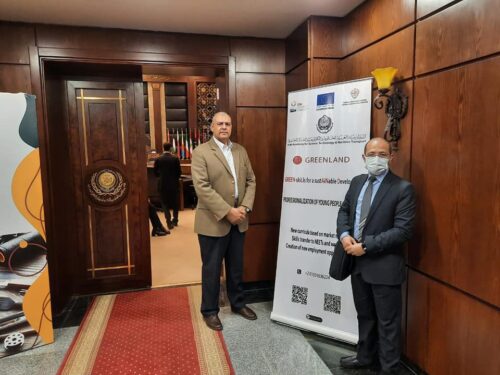
Greenland is another European Program that has itrrots in European values. As enshrined in the Treaty on European Union, ‘The Union is founded on the values of respect for human dignity, freedom, democracy, equality, the rule of law and respect for human rights, including the rights of persons belonging to minorities. These values are common to the Member States in a society in which pluralism, non-discrimination, tolerance, justice, solidarity and equality between women and men prevail.’
These values are an integral part of the European way of life. Human dignity constitutes the basis of fundamental rights; it must be respected and protected.
Human rights are protected by the EU Charter of Fundamental Rights. These cover the right to be free from discrimination on the basis of sex, racial or ethnic origin, religion or belief, disability, age or sexual orientation, the right to the protection of your personal data and the right to get access to justice.
In 2012, the EU was awarded the Nobel Peace Prize for advancing the causes of peace, reconciliation, democracy and human rights in Europe.
Being an EU citizen also means enjoying political rights. Every adult EU citizen has the right to stand as a candidate for and vote in European Parliamentary elections, whether in their country of residence or country of origin.
In Greece ERFC and i-BECK are the Key actors for Greenland. This synergy will bring a sustainable collaboration also to the future. Climate change is already here and we have totally to change the rules of the game and our mindset.
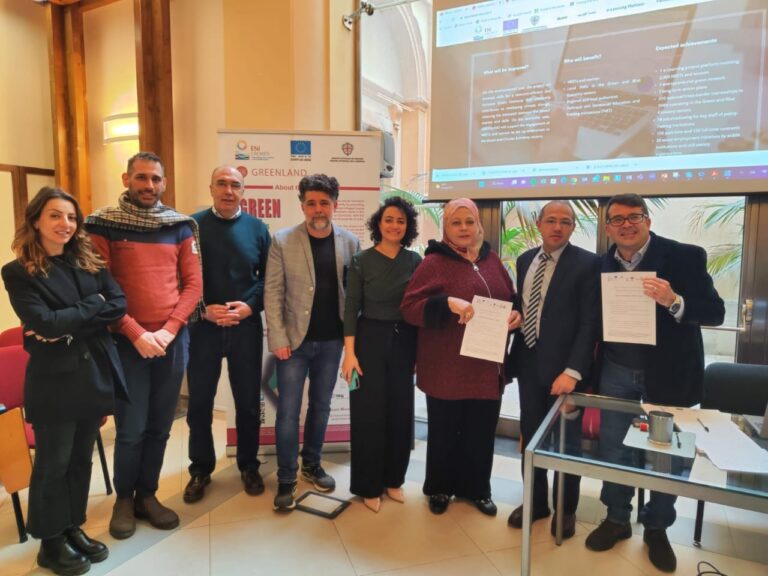
This is how GREENLAND (GREEN-skiLls for a sustAiNable Development) is born, a European project which goals at building a collaboration network between Italy, Lebanon, Jordan, Egypt, Palestine, Portugal and Greece to support the employability of unskilled youth by providing them with marketable skills and qualifications within the Green and Circular Economy sectors.
The project, funded by the European Union under the ENI CBC MED programme, with a budget of 3.8 million euros, gathers the Region of Calabria and the Advanced Research Center on Electronic Systems “Ercole de Castro” in Italy, the Planning and Development Agency in Lebanon, the National Agricultural Research Center in Jordan, the Arab Academy for Science, Technology and Maritime Transport in Egypt, the Hisham Hijjawi College of Technology in Palestine, the University of Algavre, European Regional Framework for Co-operation and the Interbalkan Environment Center in Greece.
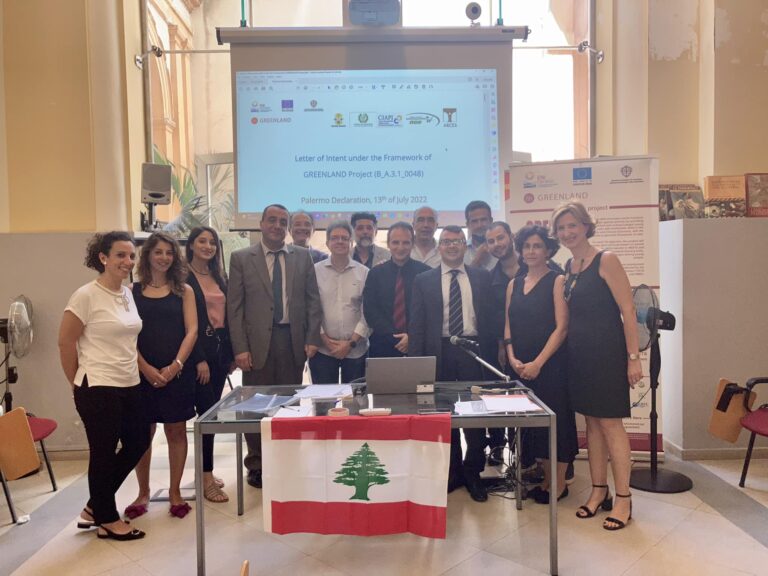
A letter of intent has been signed between GREENLAND partners (Calabria Region leader beneficiary partner, Arces Collegio Universitario project partner from Sicily, Planning Development Agency project partner from Lebanon), C.I.A.P.I. and Anpal Servizi (the agencies supporting sicilian employment policies), Associazione Organismi di Formazione (ASSOFOR) and the National Employment Office (NEO) of Lebanon.
Prof. Alaa Abdelbarey, the legal representative of the AASTMT, welcomed the participants in GREENLAND to makesure that everything is going well.
Then Dr. Mohamed Youssef, GREENLAND Project Manager introduced Dr. Ahmed Elsayed from SMART MEDIA Company that designed, established, developed and finally delivered the e-learning platform
Dr. Ahmed started the training from 10.30 am till 3.00 pm through two sessions.
The first one was a detailed explanation to the MEETING HUB PLatform that will allow all the project partners for virtual meeting together and also meet with the NEETs and women for online training. ALL the partners have joined it for a trial and they were happy with all the features presented such as chatting , raising hands for questions, recording and controlling options for virtual sessions. This will add on a specific privellage for GREENLAND Project as it will allow through it the NEETS and the mentors.
The second session was a full detailed presentation highlighting the features of the e-learning platform including the categories, the questions bank, the quizes, the evaluation of NEETs to reach the e-Portfoli
A letter of intent has been signed between GREENLAND partners (Calabria Region leader beneficiary partner, Arces Collegio Universitario project partner from Sicily, Planning Development Agency project partner from Lebanon), C.I.A.P.I. and Anpal Servizi (the agencies supporting sicilian employment policies), Associazione Organismi di Formazione (ASSOFOR) and the National Employment Office (NEO) of Lebanon.
Prof. Alaa Abdelbarey, the legal representative of the AASTMT, welcomed the participants in GREENLAND to makesure that everything is going well.
Then Dr. Mohamed Youssef, GREENLAND Project Manager introduced Dr. Ahmed Elsayed from SMART MEDIA Company that designed, established, developed and finally delivered the e-learning platform
Dr. Ahmed started the training from 10.30 am till 3.00 pm through two sessions.
The first one was a detailed explanation to the MEETING HUB PLatform that will allow all the project partners for virtual meeting together and also meet with the NEETs and women for online training. ALL the partners have joined it for a trial and they were happy with all the features presented such as chatting , raising hands for questions, recording and controlling options for virtual sessions. This will add on a specific privellage for GREENLAND Project as it will allow through it the NEETS and the mentors.
The second session was a full detailed presentation highlighting the features of the e-learning platform including the categories, the questions bank, the quizes, the evaluation of NEETs to reach the e-Portfoli
Here you can see:
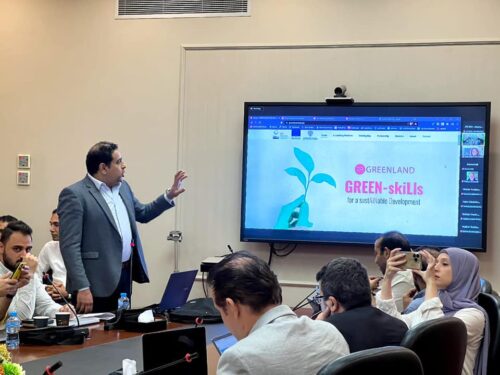
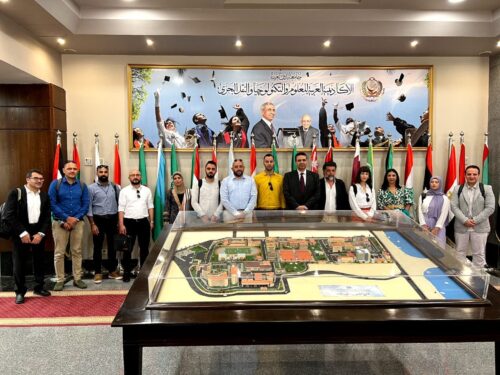
Under the framework of GREENLAND project WP5 – Job Shadowing, this cooperation agreement aims to implement joint initiatives with the ultimate goal to develop educational programs more suited to the needs of the labor market, share application models, methodologies, approaches regarding active labor market policies.
A further commitment made by the partners is to enhance the e-learning platform of the Greenland project and transfer emerging skills and new training curricula from the Italian national and regional agencies to the Southern Mediterranean countries, in particular Lebanon with particular reference to the National Employment Office (NEO).
The goal is common: To increase the employability of up to 30 years old unskilled people and women of all ages, by providing them with marketable skills and qualifications to prepare them for skill-based occupations within the Green and Circular Economy sectors and reduce skill mismatches in rural areas particularly affected by the climate change.
GREENLAND in Greece, ERFC & i-BECK is offering free of charge courses on green and circular economy. The objective is to train up to 300 young people who are Not in Employment, Education or Training (NEET)s and women , who reside permanently in Central Macedonia or Thrace.
1. The first phase will be online, and based on individual learning of basic skills that are useful for job placement in the Green and Circular economy (Soft skills, Employment skills, and Green and Circular Economy skills). At the end of the courses, a certificate of attendance will be granted (E-Portfolio certified by the project).
2. In the second phase, through an evaluation system, 120 participants will be provided with one-week on-site training in Green and Circular Economy skills which will take place in Thessaloniki.
3. Finally, a further selection of 30 participants will have the opportunity to undertake a 45-day internship, with the contribution of expenses, in one of the enterprises participating in the project.
SIGN UP NOW!
Fill out the Registration Form (Google form link in GR) and we will contact you to verify the requirements and for further information.
Entries will continue until the required number (300 NEETs and Women) is met.
GREENLAND is expected to create an e-Learning project platform involving 2,900 NEETs and women, a wide entrepreneurial green network, 210 national/cross-border traineeships in SMEs operating in the Green and Blue Economy sectors, 18 job-shadowing for key staff of policy-making institutions, 150 part-time and 150 full-time contracts, 20 social employment initiatives by public institutions and civil society organizations.
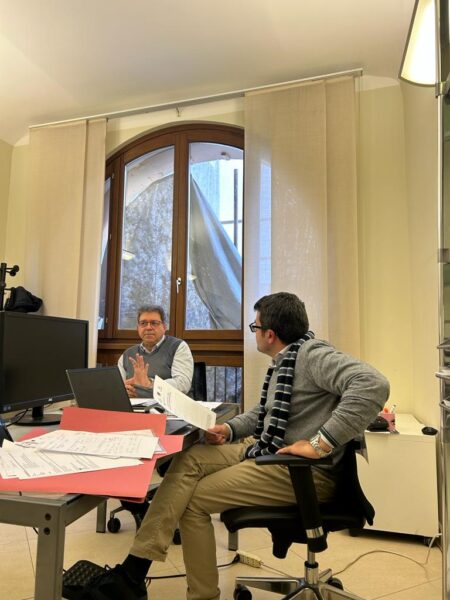
Cluster Enicbc MED Project and GREENLAND Med Project:
20.04.2023
P2P Meeting held today between Mr. Pernice Alessandro and Mr. Maurizio Lo Piccolo (National Agency for Labour active Market Policies) to discuss about the NEETs engagement process and related training courses.
Under Cluster Enicbc We are currently planning our A2.2.1 Regional Info Campaign through the support of ANPAL said to us Mr. Pernice Alessandro. The goal of a such campaign is to inform NEETs about the local training opportunities, but also we would like to get involved local stakeholders (SMEs, third sectors) as these stakeholders should host our NEETs. The campaign will take place in May 2023.
On 10th of May Greenland will have a 3 hrs panel with eminent acadeicians, enterpreneuers, and politicians to disscuss about the circular economy and all the benefits that could bring in society.
8-10 June 2023, during the JobShadowing Forward Green, the biggest Green Expo which will take place in Thessaloniki the Palestinian Delegation will have the change to visit Greece and to be educated in new methodology as consider the new tendecies of the Market of the Green and Sustainable new mentality of Circular Economy values.
Personalities
BCI24NEWS
Lena Kyropoulos






